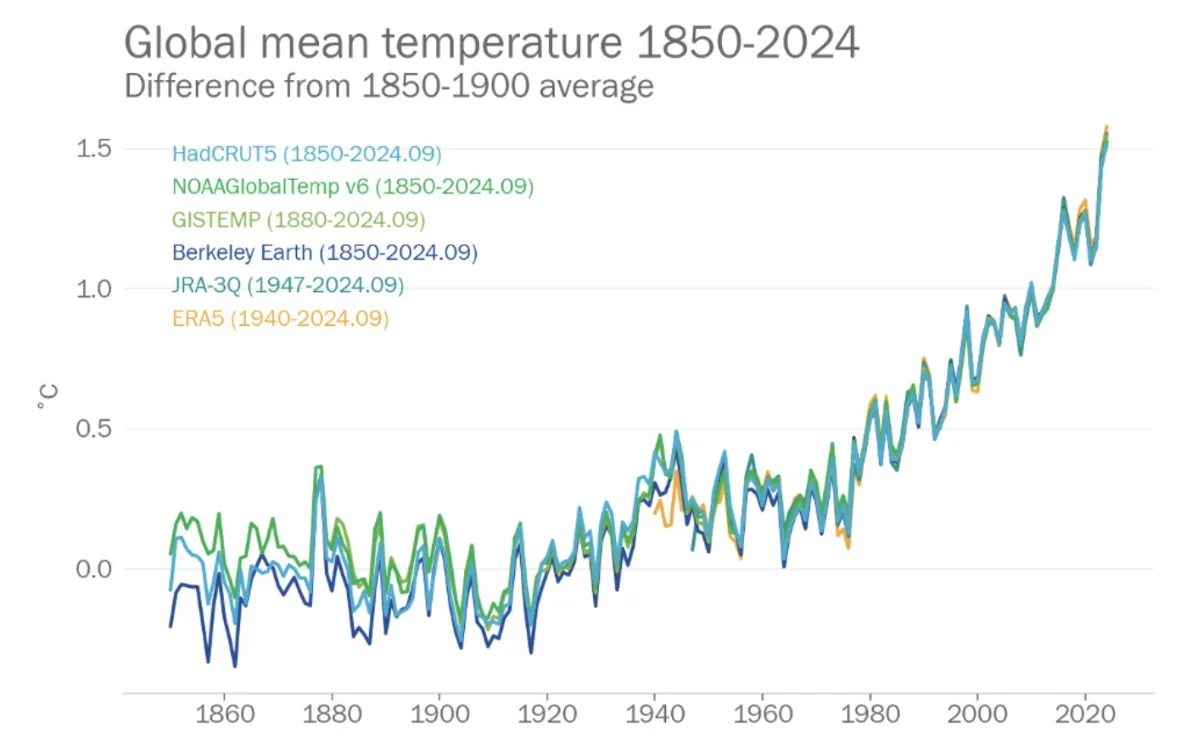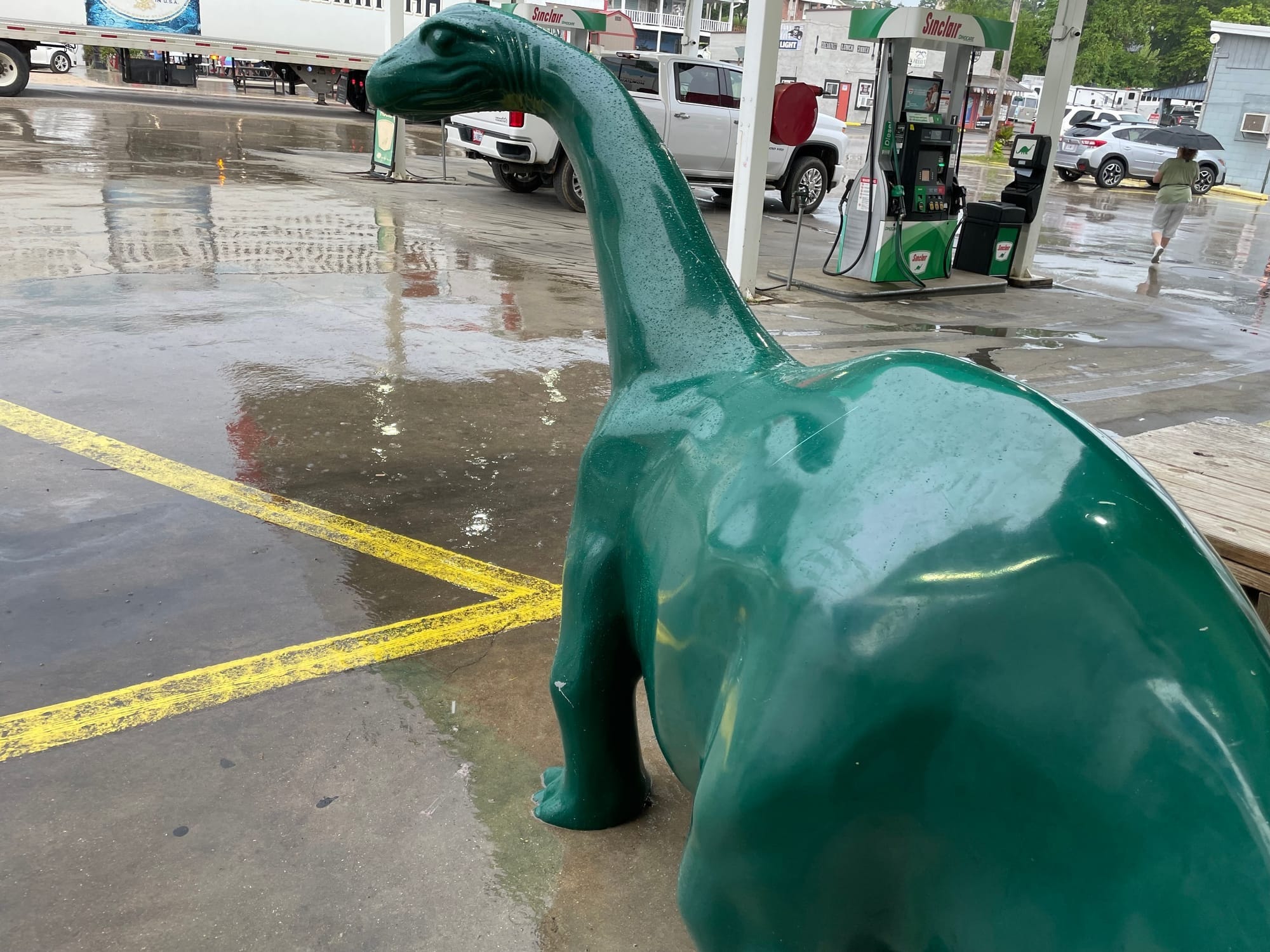"Greenhouse gas pollution at these levels will guarantee a human and economic trainwreck for every country, without exception." — Climate Defiance, upon hearing the recent news that atmospheric concentrations of all three major greenhouse gases hit records in 2023
“People shouldn’t think the game is over because we passed 1.5 degrees. The game is never over.”—Andrew Dessler, director of Texas A&M University’s Texas Center for Climate Studies.
“With the reelection of Donald Trump, a candidate who has flaunted his desire for autocracy—aided and abetted by a Republican-controlled Congress that will not constrain him with guardrails—the United States is now poised to become an authoritarian state ruled by plutocrats and fossil fuel interests. It is now, in short, a petrostate.”—Climatologist Michael E. Mann
“The truth is that Donald Trump can only slow, not stop the clean energy transition. The U.S. is only responsible for about a 10th of global emissions, and China, not America, is now the world’s largest market (by far) for cars and trucks, electricity, and industrial commodities like steel and cement. Trump cannot wind back the clock on technological innovation or dampen the appetite for EVs and clean energy in the rest of the world.”—Jesse D. Jenkins
“Clearly we are not magically resistant to authoritarianism—indeed we’ve now embraced a flavor of it. And clearly America is not going to play the commanding role in helping solve the climate crisis, the greatest dilemma humans have ever encountered. For the next few years the best we can hope is that Washington won’t manage to wreck the efforts of others—and that some parts of this big nation will demonstrate what’s still possible. And that many of us can join in a genuinely global citizens’ fight for rapid action.”—Bill McKibben
In the wake of the Republican election victory, the last thing anyone needs to hear right now is more gloom and doom. Unfortunately, it’s unavoidable. Because, despite being scarcely mentioned in the campaign, the climate and biodiversity crises didn’t vanish from our reality the way they mostly did from the big media over the past few months. With an incoming administration and Congress brimful of climate science deniers, the reality and perils of the crises are made starker still. There’s no sugarcoating this. The potential for long-term damage to the environment and to U.S. and global efforts to deal with climate change is immense.
The Trump team is itching to get their hands around the throats of the Environmental Protection Agency and other agencies and sub-agencies well beyond what the Supreme Court has already accomplished with its recent pernicious rulings. Needless to say, this is going to set back the modest U.S. efforts so far enacted to address increasingly negative climate and biodiversity impacts. Urgency under Trump will be reserved for again cutting taxes on the wealthy, not for cutting greenhouse gas emissions.
Speaking of which, not only did those gases soar since January, nearly two weeks ago the European Union’s Copernicus Climate Change Service presented its annual report, announcing that 2024 is the hottest year on record and we’ve still got nearly two months to go. It also is the first full year the 1.5° Celsius (2.7° Fahrenheit) target was breached.
Last November, famed climatologist James Hansen wrote in Oxford Open Climate Change that the average global temperature rise over the pre-industrial era would exceed 1.5°C in the 2020s and 2°C by 2050. If pledges countries have made to cut emissions under the Paris Agreement were met, the temperature rise would still hit a disastrous 2.7°C (4.9°F) by 2100. However, in most countries, even those inadequate pledges aren’t being met. ”The 1.5-degree limit is deader than a doornail,” Hansen says.
Just a week before the election, one of the other organizations that measure global warming, the World Meteorology Organization, released its Greenhouse Gas Bulletin, noting that all three main greenhouse gases reached record atmospheric levels in 2023. Atmospheric concentrations of carbon dioxide hit 420.0 parts per million, a level 151% higher than the pre-1750 level that was last seen 3-5 million years ago. Back then, global temperatures was 2-3°C hotter than now and sea levels were 10-20 meters (33-66 feet) higher. Methane reached 1,934 parts per billion (ppb). That’s 265% higher than preindustrial levels. The third major greenhouse gas, nitrous oxide, rose to 336.9 ppb, 125% of pre-industrial times. If you’re not quite sure what 3°C (5.4°F) would look like, click here.
In a statement, WMO Secretary-General Celeste Sauloin said: "Another year. Another record. This should set alarm bells ringing among decision-makers. We are clearly off track to meet the Paris agreement goal of limiting global warming to well below 2°C and aiming for 1.5°C above preindustrial levels. These are more than just statistics. Every part per million and every fraction of a degree temperature increase has a real impact on our lives and our planet."
Alarm bells have certainly been going off among climate scientists. All too many politicians are deaf to them.
Here’s Climate Defiance: "The report is very clear: This crisis is driven by the profit-driven production of coal, oil, and gas. Because of these fuels, planet-heating pollution levels have gone up by 51.5%—since 1990 alone."
Researchers at the Global Carbon Project reported this week that there is “no sign” of fossil fuel emissions peaking. They predict this year will end with carbon dioxide emissions from burning oil, gas, and coal reaching about 37.4 billion metric tons, a worldwide rise of 0.8% from 2023. They also estimate that 1.5°C target will be permanently breached in 2030. As far as the fossil fuel industry’s favorite solution to curbing the climate crisis is concerned, the researchers pointed out that “Current levels of technology-based Carbon Dioxide Removal (excluding nature-based means such as reforestation) only account for about one-millionth of the CO2 emitted from fossil fuels.”
As we can see from the response to heavy immigration into Europe and the United States, the coming flow of hundreds of millions of people worldwide because of climate change is going to be met with ferocious resistance and, in all likelihood, extensive violence. Climate change already contributes to the reason undocumented immigrants are desperate to cross the U.S. border. Soon enough, many more will be coming for that reason. The potential for conflict over this is gigantic.
In her Letter from Greenland at The New Yorker, Elizabeth Kolbert writes:
There is, in principle, nothing wrong with a warmer world, or even one whose climate bounces around. At many points in history, the Earth has been much hotter than it is today. During a period known as the Cretaceous Thermal Maximum, for instance, around ninety million years ago, breadfruit trees grew on Greenland, and a rain forest thrived on Antarctica. During the Wisconsin [100,000-11,000 years ago], as temperatures yo-yoed up and down, people were living Africa, Europe, Asia, Australia, and quite possibly North and South America. Some of them managed to get by or we wouldn’t be here.
But the society we have now was built for the climate we have now, or at least a close approximation of it. Alter the world by, say, drowning Dhaka or Shanghai and all sorts of knock-on effects follow. Last year’s report on global tipping points—the one produced by more than two hundred researchers—predicted that “escalating climate change” will increase “the risk of violent conflict” and that this, in turn, will “undermine societies’ ability to cooperate,” leading to yet more climate change.
As nature keeps reacting to the chemical changes civilization has been putting it through, the incoming administration has big plans that will inevitably worsen the climate and biodiversity crises. Although there have been plenty of hints of the bad stuff to come, and we’re to have the fossil fuel tool Lee Zeldin as EPA chief, the details about process are far from clear. Trump has promised, “On Day 1, I will sign an executive order directing every federal agency to immediately remove every single burdensome regulation driving up the cost of goods."
What Trump, Elon Musk, and a herd of like-minded plutocrats are eager to do is stamp “burdensome” on every rule they don’t like or that pinches one of their fat-cat pals. The system for creating federal rule-making, including rule-changing (and presumably rule deleting), is robust and thorough, and as such not easily rushed. That, however, could be changed.
Whether Trump follows Exxon’s advice and sticks with the Paris Agreement is irrelevant when every other energy policy he endorses feeds more carbon into the atmosphere. And it’s certain he has no intention of upping America’s contribution to fund the green transition and other climate adaptations in the Global South, which has released the fewest emissions and is suffering most of the pain.
Infuriating and frustrating as the cabal of climate illiterates headed for the nation’s highest office are, and as scary as every new emissions report is, the situation isn’t without hope. But, once again, no sugarcoating—the options are limited.
To offer one example, there is a collection of states, including two of the largest, that make their own climate policies. Jeff St. John at Canary Media writes about Climate Cabinet in this regard. The organization helps state and local leaders “run, win, and legislate on climate change.” It supported more than 170 candidates in Tuesday’s election and a significant number won. Executive Director Caroline Spears said that states have “always been key to climate policies” and now, with a Trump administration expected to try to dismantle the Biden administration’s climate policies and enable the production of even more fossil fuels, it’s “up to state leaders to hold the line.”
Supporting such state leaders is one good place for climate activists to spend their efforts. But it will take plenty of other actions to cripple the new administration’s myopic, dystopian climate policy plans as well as the fossil fuel industry’s continuing cozy relationship with the world’s largest banks when it comes to extracting every last molecule of oil and gas.
Many progressives are understandably, justifiably deep in depression over the election. Numerous people say they’re giving up politics altogether. Much of that, I suspect is reflexive, and will be replaced in many cases by a new determination. In that light, I’d like to end with a quotation on election night from the remarkable Rebecca Solnit:
They want you to feel powerless and to surrender and to let them trample everything and you are not going to let them. You are not giving up, and neither am I. The fact that we cannot save everything does not mean we cannot save anything and everything we can save is worth saving. You may need to grieve or scream or take time off, but you have a role no matter what, and right now good friends and good principles are worth gathering in. Remember what you love. Remember what loves you. Remember in this tide of hate what love is. The pain you feel is because of what you love.
The Wobblies used to say don't mourn, organize, but you can do both at once and you don't have to organize right away in this moment of furious mourning. You can be heartbroken or furious or both at once; you can scream in your car or on a cliff; you can also get up tomorrow and water the flowerpots and call someone who's upset and check your equipment for going onward. A lot of us are going to come under direct attack, and a lot of us are going to resist by building solidarity and sanctuary. Gather up your resources, the metaphysical ones that are heart and soul and care, as well as the practical ones.
People kept the faith in the dictatorships of South America in the 1970s and 1980s, in the East Bloc countries and the USSR, women are protesting right now in Iran and people there are writing poetry. There is no alternative to persevering, and that does not require you to feel good. You can keep walking whether it's sunny or raining.
All the bad news doesn’t have to be a prediction of our destiny.












Comments
We want Uncharted Blue to be a welcoming and progressive space.
Before commenting, make sure you've read our Community Guidelines.